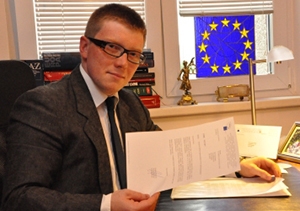- 2012/12/10
The case of Polish minority in Lithuania is being discussed, the European Commission’s position has a consultative character for the European Parliament


Recently the Lithuanian media have published a number of articles according to which the investigation of my petition by institutions of the European Union has already been closed. Moreover, the articles inform that the European Commission claims the issues described in the petition are within the competence of the member countries.
The aforementioned information omits a few significant facts and consequently misleads the public opinion. Firstly, according to the position the European Commission, Poland and Lithuania should cooperate in order to solve the problems of minorities and the national governments are obliged to cooperate within the scope of the minorities’ rights. Taking into account the rules of diplomatic language, it means much more than the interpretation presented in the Lithuanian media. Secondly, in April, during the session of the Committee on Petitions, the European Parliament did not agree with the statement of the European Commission according to which that institution did not have competence to act in that case. It was decided to investigate the case again. The position of the European Commission is also denied by prominent experts on the European Union law who agree that the protection of the fundamental rights remains within the competence of the institutions of the EU and they are authorized to undertake various measures to achieve this purpose. The proof of that are various initiatives of the EU within the scope of the human rights. Thirdly, the opinion of the European Commission is only a message for the members of the European Parliament. It is not binding, like for example a decision of an administrative body. It is worth stressing that the conservative attitude of the European Commission on the problems of Polish minority cannot be equal with the statement that the EU have not found any infringements committed by Lithuania. On the contrary the European Commission escaped form the analysis of the actual situation justifying itself that it did not possess competence to act in this case. I do not want to mention that the passive attitude of the European Commission concerning the respect for the human rights by a member country should worry the citizens of Lithuania as well. What they will do when their fundamental rights will be limited by their country? Who will they ask for help? It is enough about the position of the European Commission.
Meanwhile my petition no. 358/2011 have been submitted to the European Parliament and only this institution is authorized to make the final decision. The media should inform and comment on that institution’s decisions. It should be emphasized that on April 24 there was a public session during which the members of the Parliament decided to investigate the problems described in my petition. Then the European Parliament once again appealed to the European Commission for the completion of its position. On October 24 the European Commission made an unsatisfactory statement for the members. As a result, on December 3, 2012, for the second time the Committee on Petitions decided to continue the investigation of the petition against the fact that on the basis of the European Commission’s statement the investigation of my complaint clould be closed. In other words, one more time the European Parliament made a decision against the opinion of the European Commission. The omission of these significant facts leads to the disinformation of the public opinion.
It must be stressed that a petition does not serve to judge a statement or the non-existent infringement of the law but it is used to draw attention to a particular social problem. We cannot expect the European Parliament to reach a verdict on the case because it does not have competence to act in this case. However, we have the right to present our problems and arguments which, despite some obstacles, is taking place now. For over one and half year the European Parliament has been investigating the petition on the language rights of Poles in Lithuania. The petition has been already discussed once during the public session in the European Parliament. The Lithuanian government had to explain its attitude towards the Polish minority before an ordinary citizen of the EU. Many people do not notice or do not want to notice that a number of submitted petitions is not even accepted for consideration by the European Parliament. Several petitions are considered only in their written form and they will never appear in the agenda of the Parliament. The fact that the petition no. 358/2011 titled “The language rights of Poles in Lithuania” caused a public debate is the proof that the European Parliament has noticed the gravity of the problem, however, it is still not enough when we consider the number of possible measures that could be undertaken against the infringement of the fundamental rights by the EU member country. Nevertheless, it is a success if we take into consideration the resistance to the petition and thousands of cases that are submitted by ordinary citizens to this main institution of the EU.
Tomasz Snarski
Translated by Karolina Rolka within the framework of a traineeship programme of the European Foundation of Human Rights, www.efhr.eu.



